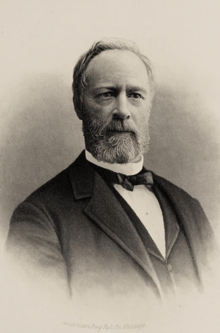Frederick Charles Winkler
Frederick Charles Winkler (March 15, 1838 – March 22, 1921) was a German American immigrant, lawyer, and politician. He was a Union Army officer in the American Civil War and later served in the Wisconsin State Assembly.
Frederick C. Winkler | |
|---|---|
 | |
| Member of the Wisconsin State Assembly from the Milwaukee 4th district | |
| In office January 1, 1872 – January 1, 1873 | |
| Preceded by | Charles M. Hoyt |
| Succeeded by | Gottlob E. Weiss |
| Personal details | |
| Born | Frederick Charles Winkler March 15, 1838 Bremen, German Confederation |
| Died | March 22, 1921 (aged 83) Los Angeles, California |
| Resting place | Forest Home Cemetery Milwaukee, Wisconsin |
| Political party | Republican |
| Spouse(s) |
|
| Children |
|
| Mother | Elizabeth (Overbeck) Winkler |
| Father | Carl Winkler |
| Profession | lawyer |
| Military service | |
| Allegiance | |
| Branch/service | Union Army |
| Years of service | 1861–1865 |
| Rank | |
| Commands | 26th Reg. Wis. Vol. Infantry |
| Battles/wars | American Civil War |
Biography
Winkler was born on March 15, 1838, in Bremen.[1] He died on March 22, 1921 in Los Angeles, California and is buried in Forest Home Cemetery in Milwaukee, Wisconsin.
Military career
Winkler served on the staffs of Franz Sigel and future U.S. Secretary of the Interior Carl Schurz. He was then assigned to the 26th Wisconsin Volunteer Infantry Regiment as a captain on September 17, 1862.[2] He was wounded at the Battle of Gettysburg on July 1, 1863.[2] He was promoted to major on December 1, 1863 and lieutenant colonel on July 8, 1864.[2] He received an appointment as brevet colonel to rank from June 15, 1865, preliminary to his appointment as a brevet brigadier general of volunteers.[2][3] On January 13, 1866, President Andrew Johnson nominated Winkler for appointment to the grade of brevet brigadier general of volunteers to rank from March 13, 1865, and the United States Senate confirmed the appointment on March 12, 1866.[4]
Assembly career
Winkler was a member of the Assembly during the 1872 session.[5] He was a Republican.
References
- "He was born in 1838 in Bremen, Germany, and came to the U.S. with his family in 1844."
- Eicher, John H., and David J. Eicher, Civil War High Commands. Stanford: Stanford University Press, 2001. ISBN 0-8047-3641-3. p. 575.
- His confirmation date as brevet colonel was almost certainly before his confirmation date as brevet brigadier general despite the later rank date.
- Eicher, 2001, p. 761.
- Lawrence S. Barish, ed. (2007). State of Wisconsin Blue Book 2007 - 2008. p. 187.